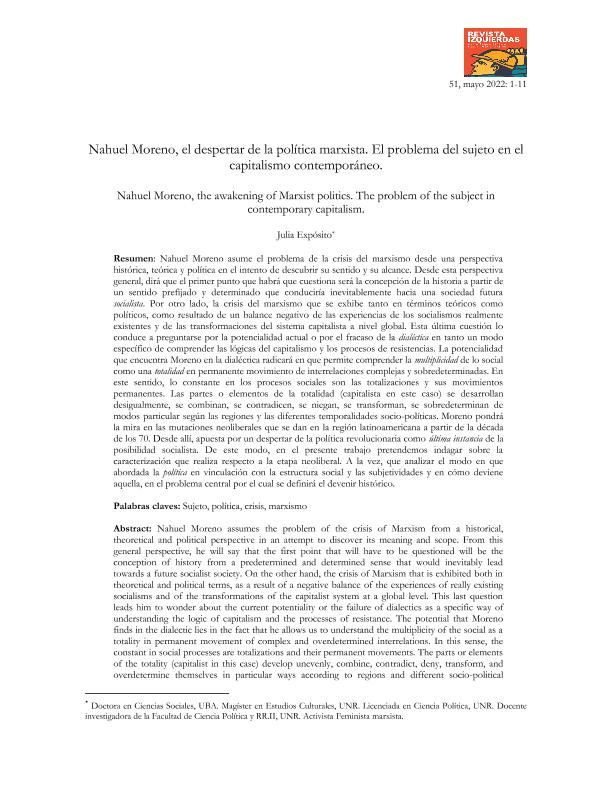Mostrar el registro sencillo del ítem
dc.contributor.author
Exposito, Julia Esperanza

dc.date.available
2023-08-01T10:25:29Z
dc.date.issued
2022-05
dc.identifier.citation
Exposito, Julia Esperanza; Nahuel Moreno, el despertar de la política marxista: el problema del sujeto en el capitalismo contemporáneo; Universidad de Santiago de Chile. Instituto de Estudios Avanzados; Izquierdas; 5-2022; 1-11
dc.identifier.issn
0718-5049
dc.identifier.uri
http://hdl.handle.net/11336/206262
dc.description.abstract
Nahuel Moreno asume el problema de la crisis del marxismo desde una perspectivahistórica, teórica y política en el intento de descubrir su sentido y su alcance. Desde esta perspectivageneral, dirá que el primer punto que habrá que cuestiona será la concepción de la historia a partir deun sentido prefijado y determinado que conduciría inevitablemente hacia una sociedad futurasocialista. Por otro lado, la crisis del marxismo que se exhibe tanto en términos teóricos comopolíticos, como resultado de un balance negativo de las experiencias de los socialismos realmenteexistentes y de las transformaciones del sistema capitalista a nivel global. Esta última cuestión loconduce a preguntarse por la potencialidad actual o por el fracaso de la dialéctica en tanto un modoespecífico de comprender las lógicas del capitalismo y los procesos de resistencias. La potencialidadque encuentra Moreno en la dialéctica radicará en que permite comprender la multiplicidad de lo socialcomo una totalidad en permanente movimiento de interrelaciones complejas y sobredeterminadas. Eneste sentido, lo constante en los procesos sociales son las totalizaciones y sus movimientospermanentes. Las partes o elementos de la totalidad (capitalista en este caso) se desarrollandesigualmente, se combinan, se contradicen, se niegan, se transforman, se sobredeterminan demodos particular según las regiones y las diferentes temporalidades socio-políticas. Moreno pondrála mira en las mutaciones neoliberales que se dan en la región latinoamericana a partir de la décadade los 70. Desde allí, apuesta por un despertar de la política revolucionaria como última instancia de laposibilidad socialista. De este modo, en el presente trabajo pretendemos indagar sobre lacaracterización que realiza respecto a la etapa neoliberal. A la vez, que analizar el modo en queabordada la política en vinculación con la estructura social y las subjetividades y en cómo devieneaquella, en el problema central por el cual se definirá el devenir histórico.
dc.description.abstract
Nahuel Moreno assumes the problem of the crisis of Marxism from a historical, theoretical and political perspective in an attempt to discover its meaning and scope. From this general perspective, he will say that the first point that will have to be questioned will be the conception of history from a predetermined and determined sense that would inevitably lead towards a future socialist society. On the other hand, the crisis of Marxism that is exhibited both in theoretical and political terms, as a result of a negative balance of the experiences of really existing socialisms and of the transformations of the capitalist system at a global level. This last question leads him to wonder about the current potentiality or the failure of dialectics as a specific way of understanding the logic of capitalism and the processes of resistance. The potential that Moreno finds in the dialectic lies in the fact that he allows us to understand the multiplicity of the social as a totality in permanent movement of complex and overdetermined interrelations. In this sense, the constant in social processes are totalizations and their permanent movements. The parts or elements of the totality (capitalist in this case) develop unevenly, combine, contradict, deny, transform, and overdetermine themselves in particular ways according to regions and different socio-political temporalities. Moreno will set his sights on the neoliberal mutations that occurred in the Latin American region from the 70's. From there, he committed to an awakening of revolutionary politics as the last instance of the socialist possibility. In this way, in the present work we intend to inquire about the characterization that he makes regarding the neoliberal stage. At the same time, to analyze the way in which politics is approached in connection with the social structure and subjectivities and how it becomes the central problem by which the historical evolution will be defined.
dc.format
application/pdf
dc.language.iso
spa
dc.publisher
Universidad de Santiago de Chile. Instituto de Estudios Avanzados
dc.rights
info:eu-repo/semantics/openAccess
dc.rights.uri
https://creativecommons.org/licenses/by-nc-sa/2.5/ar/
dc.subject
SUJETO
dc.subject
POLÍTICA
dc.subject
CRISIS
dc.subject
MARXISMO
dc.subject.classification
Otras Ciencia Política

dc.subject.classification
Ciencia Política

dc.subject.classification
CIENCIAS SOCIALES

dc.title
Nahuel Moreno, el despertar de la política marxista: el problema del sujeto en el capitalismo contemporáneo
dc.title
Nahuel Moreno, the awakening of Marxist politics: The problem of the subject in
contemporary capitalism
dc.type
info:eu-repo/semantics/article
dc.type
info:ar-repo/semantics/artículo
dc.type
info:eu-repo/semantics/publishedVersion
dc.date.updated
2023-07-07T20:57:03Z
dc.journal.pagination
1-11
dc.journal.pais
Chile

dc.description.fil
Fil: Exposito, Julia Esperanza. Universidad Nacional de Entre Ríos. Instituto de Estudios Sociales. - Consejo Nacional de Investigaciones Científicas y Técnicas. Centro Científico Tecnológico Conicet - Santa Fe. Instituto de Estudios Sociales; Argentina
dc.journal.title
Izquierdas
dc.relation.alternativeid
info:eu-repo/semantics/altIdentifier/url/http://www.izquierdas.cl/ediciones/2022/numero-51
Archivos asociados
